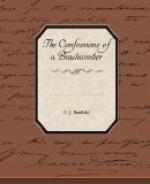Mickie appreciates a joke. When Jinny complained that the scrub caught her brand new pipe and had broken it short off, Mickie with an extravagant grimace softly urged her to go along Townsville and buy another.
He is also superstitious. After dark he will not move a yard from his camp without a flaring torch of paper bark, a fiery aspersorium for the scaring of the “debil-debil.” His opinions on the supernatural are unsatisfactory. He does not know what the “debil-debil” is like, or what form the ill-will of that mystic being would take—nothing but “that fella sit down alonga scrub,” and that he has “long fella needle alonga hand”; and so he carries and waves about his paper bark torch to scare this viewless and dreaded enemy.
Mickie’s views as to the future are not quite explicit. “Suppose me go bung, me go alonga sky. Bi’mby jump up ’nother fella.” He is not at all certain whether the transformation would be into a white man or not; in fact he appears absolutely indifferent. Another time he will say—“Suppose me go bung. Good-bye, finish; no come back. Plenty fella alonga Palm Island go bung. He no come back.” Daylight disperses all his fears. In point of fact he has nothing to fear. His foes are dead, and there is no poisonous snake or offensive animal on the Palms. Once he sprang suddenly and excitedly into the air as we tramped through the long grass on the edge of the sweetly-smelling jungle, with the exclamation, “Little fella snake!” Being reminded that he had boldly asserted that there was no bad snakes on the island, Mickie replied—“That fella no bad. Only make foot big.” He never missed a chance of securing a hatful of grubs, which, together with the chrysalides and the full-grown




